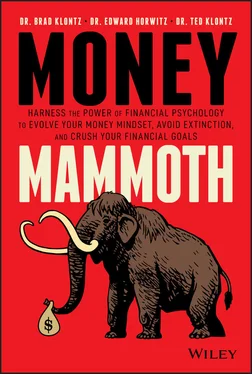1 ...6 7 8 10 11 12 ...15 Using children to pass along financial information between divorced parents (e.g., “Please tell your mother to pay me the $100 she owes me”).
Sharing your financial stress with a child (e.g., “I don't know how we are going to pay rent this month”).
Having children answer the phone when creditors call.
Talking poorly about a child's parents around money (e.g., “You can't have braces because your father won't pay child support”).
Involving children in adult financial matters can have a negative impact on their own relationship with money. While some children may feel a sense of importance that they are being involved in adult matters, they are not psychologically able to cope with and process the information. As such, the experience often leaves them feeling anxious and insecure. It is very important to talk to your children about money, but it is not okay to share too much financial information with them. A great litmus test on what is “too much” is to ask yourself this question: “Am I feeling negative emotions around this issue (e.g., scared, guilty, or anger)?” If so, you are best not to share it. A better idea is for you to share those concerns with another adult, possibly even a professional. There is no shame in having financial stress or concerns, but you need to be careful not to burden children with your issues, as it can hurt them.
A FAMILY STORY OF FINANCIAL DESTRUCTION
The Allen family came from humble financial beginnings. Fred, the father and sole breadwinner, was a science professor at the local university. The family had to stretch Fred's meager salary across the entire family, which consisted of his wife, Jane, their two daughters, and one son. As with many fathers of his generation, Fred was not very close with his children. He was a bit of a mad scientist type who was always working on some ideas in his office or in his home laboratory. The Allen family lived a typical lower middle-class existence throughout the 1950s, 1960s, and 1970s.
Then in the 1980s, Fred's line of research led him to develop something revolutionary. After splitting the rights to the idea with the university, Fred quit his job and went into business. Fred took his innovation and built a business that became worth hundreds of millions of dollars. The company was held entirely by Fred and Jane as it grew organically. The Allens became very wealthy later in life when they were well into their 60s. But Fred and Jane, never having any real money, had no idea how to manage their new-found wealth. They wound up giving all their children tens of millions to help make their lives “easier and more enjoyable,” and so that their grandchildren would “not need to struggle like they did.” One of the three children joined Fred in the business to learn, and ultimately take over some day.
Twenty years later, Jane passed away and left unequal portions of her wealth to each child. The two kids who were not involved in the business received assets and cash of a hundred million dollars each. The child working in the business received far less in dollars than the other two by half, but inherited Jane's shares of 50% ownership in the business. At the time, the two receiving cash were very happy and had no interest in the business at all. All three felt the division of assets was reasonable and fair. The other sibling worked hard to build up the business and succeed Fred as his days actively involved in the business were drawing to a close.
After another 10 years, the kids who got money had spent an overwhelming amount of their inheritance and battled personal relationship issues and substance abuse. When the money was running low, the other two siblings saw how successful the business had become and felt they were shortchanged on their mom's estate settlement. This kicked off a series of lawsuits and resentment among the siblings. The one sibling was deeply hurt and angered that the hard work and dedication he had contributed to grow the organization was believed to be “owed” to the other two siblings who “partied away their money.” The two siblings co-opted Fred, who had become severely afflicted with dementia, and ganged up against the single sibling who was now controlling and running the organization. Finally, to save any remnants of their family, and to help reconcile while Fred was still alive, the one sibling agreed to sell the company and settle. Unfortunately, they began fighting about the valuation and at what price to sell the business.
Fred passed away years ago, and his 50% of the business was divided among the children, who are now in their 60s and 70s. However, the three siblings are still embroiled in ongoing lawsuits. The one sibling still has a controlling interest in the business and runs the organization very successfully. The kids have now been fighting in the courts for over 15 years, and their families never speak. They have been fighting for so long and their bitterness is so deep, it's doubtful they can even remember what exactly they are fighting about. All three families should be set for life each with hundreds of millions of dollars. However, instead of enjoying their wealth and the time they have left, they waste time and money fighting over a few million here or there.
Fred and Jane's children had children of their own, all of whom were exposed to exceptional levels of wealth growing up. The family had many private jets, anything the children wanted they got, and their children's weddings were like royal affairs. Fred and Jane's children provided everything for their kids, so they never wanted or felt deprived. New York townhomes, Hollywood apartments, sports cars, and a healthy allowance were all lavishly provided to them. Almost all of Fred and Jane's grandchildren have subsequently struggled with failed relationships and substance abuse as well. Very soon they will have children of their own. How do you think their life stories will unfold?
This story is not that unusual for situations like these. Do you think the Allens were happier when they were middle class or super wealthy? Do you think that having more money will really make life better and make your family happier? Research would beg to differ. Studies consistently show that above middle class, there is no significant correlation between money and happiness.
When we are young, we see our parents as people who always know the answers. That's probably why as soon as we can think independently, around the ages of 4–5, we start asking a lot of questions. Parents try to answer these questions in a way that a young mind can comprehend and in a way that is likely to end the barrage of questions. However, when it comes to learning lessons about money, our parents' answers to these questions get written into a money blueprint. Even worse, a passing comment about money in the kitchen or at the dinner table can have a lasting effect. For example, a common phrase used by parents in response to a child's request for something is “No, we can't afford that.” Think for a moment about how a young mind might interpret that. The message could be interpreted as “we don't have enough money” or “there isn't enough money.” These Money Scripts ®can lead to an entire life designed around making sure there is always enough money through an obsession around work. It could lead to someone feeling deprived and a propensity for overspending in adulthood to avoid the feeling of deprivation. It could also lead to a sense of learned helplessness; the logic being that since there isn't enough money, why bother trying to save or get ahead?
Innocent answers and simple reasoning can become the basis for our financial decision-making well into adulthood. Since money is not talked about overtly in many families, these simple misunderstandings or misinterpretation can often go unexamined. Probably not the best way to base sound financial decision-making for generations. Our parents' money beliefs and behaviors are, of course, shaped by their parents and so on. These Money Scripts ®get handed down generationally, influenced and shaped by the financial experiences of each generation. These flashpoints leave their mark and can change the path of family Money Scripts ®.
Читать дальше












